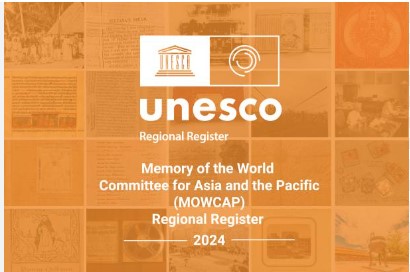Context:
Recently, The Ramcharitmanas, Panchatantra and Sahṛdayāloka-Locana have been included in ‘UNESCO’s Memory of the World Asia-Pacific Regional Register’.
More on the news
- The Indira Gandhi National Centre for the Arts (IGNCA), played a crucial role in securing a historic moment during the 10th meeting of the Memory of the World Committee for Asia and the Pacific (MOWCAP) held in Ulaanbaatar, Mongolia.
- IGNCA Advocated for three Indian nominations (The Ramcharitmanas, Panchatantra, and Sahṛdayāloka-Locana), it ensured their placement in ‘UNESCO’s Memory of the World Asia-Pacific Regional Register’.
- This marks the first time IGNCA has submitted nominations to the Regional Register since its inception in 2008.
The Indira Gandhi National Centre for the Arts (IGNCA)
- The IGNCA was launched on 19th November, 1985.
- The Indira Gandhi National Centre for the Arts Trust was constituted and registered at New Delhi on 24th March 1987.
- The IGNCA was established in 1987 as an autonomous institution under the Ministry of Culture, as a centre for research, academic pursuit and dissemination in the field of the arts.
Memory of the World Committee for Asia and the Pacific (MOWCAP)
- It was set up in 1998 and is the regional forum for UNESCO’s global Memory of the World (MOW) Programme.
- The MOW is an international programme aimed at safeguarding, preserving and facilitating access to and the use of documentary heritage. It was launched by UNESCO in 1992.
- It aims to assist with the preservation of and universal access to documentary heritage of the Asia/Pacific region.
Significance of Inclusion in UNESCO’s Memory of the World Asia-Pacific Regional Register’
- It signifies a step forward in global cultural preservation efforts, highlighting the importance of recognizing and safeguarding the diverse narratives and artistic expressions that shape our shared humanity.
- By honouring these literary masterpieces, society not only pays homage to the creative genius of their creators but also ensures that their profound wisdom and timeless teachings continue to inspire and enlighten future generations.
The Ramcharitmanas
- It was composed by Goswami Tulsidasji and became famous in the 16th century, which is in the Awadhi language. Awadhi is a dialect of the Hindi region. It is spoken in the “Awadh region” of Uttar Pradesh.
- The Ramcharitmanas composed of seven chapters known as seven kands.
- Goswami Tulsidasji has described in this book with Doha, Chaupai, Sorath, and verses.
The Panchatantra
- It represents significant fables about animal customs. According to Indian legend, Vishnu Sharma wrote the Panchatantra and submitted it as a Niti sastra.
The Sahrdayaloka-Locana
- It is a seminal text of Indian poetics by Acharya Anandvardhan.

